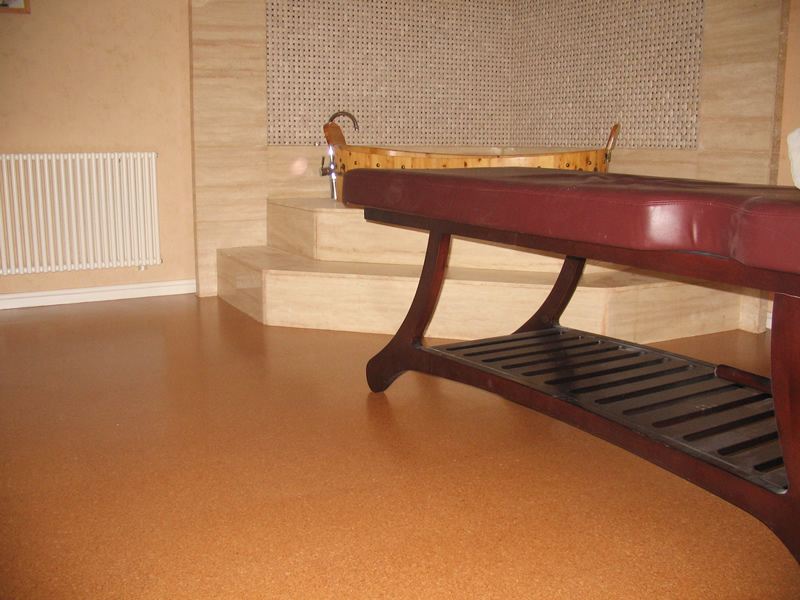Bathroom Tiles Glue Down Cork Tiles
Glue Down Cork Tiles products can be used in place of traditional bathroom tiles such as ceramic, porcelain or vinyl. Cork glue down tiles are both factory finished and site finished to produce a hardy, low-slip, water proof floor. Traditional bathroom tiles are often hard and cold on the feet and can be slick once wet. Cork tiles differ in all aspects to the routine products installed as bathroom flooring.

A glue down cork bathroom tile requires the same subfloor preparation as the traditional mortar or glue down floor product. The subfloor must be clean, dry, sound and either plywood (OSB is NOT allowed) or cement (backer board makes an excellent substrate for cork bathroom tiles). This process is identical to ceramic or porcelain requirements. Cork bathroom tiles differ at this stage.
Cork glue down tiles require a water based contact cement adhesive as part of the installation process. The homeowner or installer applies the contact cement to the subfloor in the bathroom (usually with a low or medium nap microfibre roller) and to the back of the cork tiles themselves. The installer waits for the adhesive to flash or dry (usually 45-60 minutes) and then the installation begins.
Cork bathroom tiles are installed by hand with plenty of attention paid to lining up the edges. A small bathroom should take (roughly) and hour to lay all the tiles. Once the tiles are in place, the adhesive is allowed to cure x24 hours. Light use (stocking feet) is allowed as soon as the tiles are laid. Once the 24 hours have passed the floor receives 2 coats of water based polyurethane. The floor is allowed “light use” (stocking feet) after 4 hours. The floor is considered “cured” after 5-10 days.
Cork bathroom tiles can be considered a DIY flooring project. So long as the subfloor is prepared and the old flooring has been removed (or a new subfloor installed over top of the old flooring) a glue down cork floor can be considered a project almost anyone can tackle. If you are planning on installing larger sections of glue down cork flooring, you may want to practice in the bathroom first. This will tell you if you are up to the task of installing larger amounts of product. For all other installations, a cork floating floor is always a great option.
Warm and soft, cork tiles make a very comfortable bathroom flooring surface. The Unicllic Cork Floating floor is not suitable for bathrooms; only cork tiles should be used ad bathroom tiles. After installed the cork tiles, you will need apply tow costs of water based polyurethane. This will prevent water to damaging One of our customers is installed cork tiles as bathroom tiles cork floors. He has cork tiles in the bathroom and the kitchen. It is warm under feet and soft. He dropped cups and plates in the kitchen cork floor to and cups and plates bounce back they are not damage. If you’ve ever look how fast a wine stop pops back into shape when it’s take out from the bottle, you will learn how springy and flexible and soft of cork. Its shock absorbent, translates to comfort underfoot. Cork tiles in bathroom tiles are a real good flooring in places where you spend long periods standing, such as in a kitchen or home gym. Cork tile holds warmth and muffles sound very well. We installed cork in our bedroom and it's been a struggle for me to learn to loveHow to Order
- Ordering Free Sample
- Ordering by Email
- Order Online
Shipping Info
- Pick-up Locations
Contact Info
Tel: 1-604-207-0661
Tel: 1-604-207-9541
Toll Free:
1-877-998-1198
1-866-998-1198
Fax: 1-866-373-6520
Showroom and Warehouse Address:
Cancork Floor INC
#185-1991 Savage Rd.
Richmond BC, V6V 0A4
Canada
About Cork
- Cork Floor Case Study
- Additional Inforemation
Categories
Helpful Links
- Installation
- Measurements and Maintenance
Information
- Info
- Product Information
